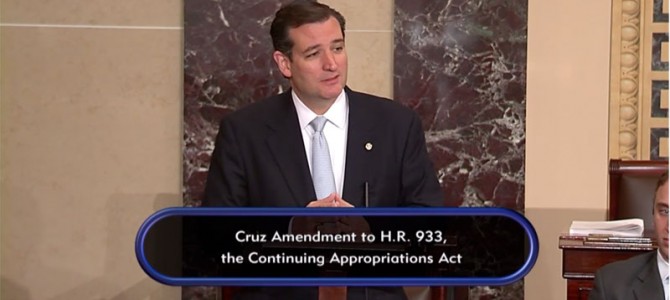The storyline that has taken hold in the media over the past few months is one of fractious infighting on the right, which has been tearing itself apart in a ludicrously public fashion over a tactical disagreement which morphed into a proxy for ideological purity: favoring a strategic assault on Obamacare which would attempt to wreck the funding of the measure through a defunding of the program. This has climaxed in the past 24 hours with Ted Cruz’s impassioned, and ultimately doomed, filibuster on the floor (with remarks that are ongoing as I write this, though it will not make it past a certain agreed upon-time). This is an effort that is much sound and fury to achieve nothing, as Harry Reid and Senate Democrats will simply kick a continuing resolution back to the House which undoes what the House Republicans did in the first place. So all of this will come to naught, and then House leadership will employ their alternate strategy, which is reportedly going to be attaching a delay to the CR… and going through this all over again. For their part, the Democrats will argue for an even shorter can kick.
The problem with this narrative is that it misunderstands the aims of virtually every figure involved. It misunderstands Cruz’s motivations (framing them as either selfish presidential teasing or bullheaded ignorance or both) and it misunderstands John Boehner’s as well. In both cases, we see the gap between optics and reality, between measuring a policy by what it would achieve as law and what it achieves as a messaging strategy… which is all either tactic represents. From the beginning, the overall stated aim of both factions has been forcing President Obama to negotiate over his policy, which virtually everyone but the White House agrees isn’t ready for prime time. The past two days have seen a host of reports on how a government shutdown would not block implementation of Obamacare – but nobody’s arguing that a shutdown would. It’s merely a gambit to force negotiation, a gambit that no one – not Cruz, not Boehner, not their supporters – really believes will succeed with a White House this emphatically devoted to implementation, ready or not.
Taking this harsh step – attaching things to funding, the debt ceiling, and the like – happens because the president is so unwilling to come to the table. It is designed to highlight extreme differences in policy, not actually change that policy. And the power of the purse is something Democrats have never been shy about using to oppose laws they don’t like on principle. Harry Reid, Hillary Clinton, John Kerry, and Barack Obama have all cast votes to cut off funding for things they dislike even in the face of opposition from the majority. Did Reid, Obama, Clinton, and Kerry vote against Iraq War funding because they didn’t want to give the troops what they needed? Did they do it because they believed such a vote would alter the course of U.S. foreign policy? Of course not. They did it for the sake of optics, the same optics that are driving Cruz and Boehner today, an attempt to leverage public opinion in their favor and highlight a disagreement where they believed the people were on their side.
Just as Rand Paul had no illusions about altering U.S. drone policy when he went to the floor, the aim is changing the conversation and focus, not the policy. Everyone on the left knew the war funding was just a show vote and that nothing would come of it, that it was a political play and not a policy proposal – but they supported it because they believed it was the right thing to do. (Assuming the right’s base is more ignorant is… something a lot of people do.) I remain convinced the base is smarter than the elites think when it understands the likelihood of success – but that does not mean it is not a fight worth having, an argument worth making. The view that you should only be praised for sticking with your convictions so long as they have no effect on anything you do is ever-present in Washington, but not so much outside of it. Arguing for lost causes is sometimes a waste of time – and sometimes, the best use of it. It’s just that simple.









